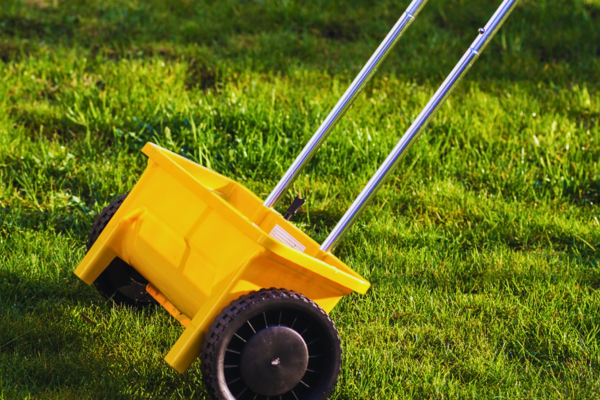
A healthy lawn is not only aesthetic, but it also benefits the overall health of your landscape soil and controls the weeds! Without a strong fertilization program, your lawn will not stay lush and green during the seasons. A nutrient-deficient plant is susceptible to pests and weed colonization.
If you live in the DE and MD beach areas and experience seasonal changes that could pose a threat to the health of your lawn, knowing how and when to fertilize your lawn is important to achieving a healthy green lawn year-round.

A Beginner’s Guide to Lawn Fertilizing
Herbicides are chemicals that eliminate weeds but allow grass to thrive. NPK — The three major nutrients in fertilizers are
- Nitrogen (N): Promotes lush, green growth.
- Phosphorus (P): Roots and overall strength.
- Potassium (K): Reduces drought, disease, and temperature stress
Each nutrient has a specific role in maintaining the health of your lawn, and the right fertilizer blend to choose will depend on your grass type, your soil composition, and the time of year.

Seasonal Fertilization Guide
Spring: Kickstart Growth
As temperatures rise, the grass comes out of winter dormancy and begins its active growing phase. A fertilizer with a higher nitrogen content can give your lawn the boost it needs. Spring fertilization helps:
- Green up the lawn quickly
- Strengthen root systems
- Prepare grass for summer stress
Tip: Apply fertilizer early in the season, but avoid over-fertilizing, which can cause excessive growth and stress on your lawn.
Summer: Strength and Protection
Heat and drought can wreak havoc on your lawn. A balanced slow-release fertilizer that contains potassium will encourage your grass to withstand heat and possible drought.
- Take care that you use fertilizers with lower nitrogen levels to prevent burning.
- Water more to keep the soil moist.
- Fertilization, mowing, and weed control should all be combined.
Tip: Refrain from fertilizing when it’s very hot; wait until early morning or evening when evaporation will be minimal.
Fall: Root Development and Winter Prep
Fall is one of the most important times to fertilize. Applying a high-phosphorus and potassium fertilizer strengthens the roots and prepares your lawn for winter.
- Encourages deeper root growth
- Helps grass store energy for winter dormancy
- Reduces weed invasion
Tip: Fertilizing in early fall ensures your grass has enough nutrients before winter dormancy sets in.
Winter: Dormancy and Protection
In winter, your lawn goes dormant, but that doesn’t mean you can ignore it. Fertilizing late in the fall or early in the winter can keep the roots healthy and set your lawn up to recuperate in the spring.
Tip: If you live in a snow-heavy environment, select a fertilizer that specifically caters to a winter lawn as a defense against the cold months.

The Science Behind Lawn Fertilization
Proper fertilization helps create a denser lawn that retards soil erosion, according to the University of Maryland Extension, and reduces the space available for weeds. Research has also shown that properly fertilized lawns take up more rainwater, resulting in less runoff and enhancing water conservation programs.
Soil testing, done through the Delaware Department of Agriculture before fertilizing, will determine what your lawn needs specifically. Too much fertilizer can wash away, damaging nearby water systems, so using the correct amount is important not only to the health of your lawn but also to the environment.

Best Practices for Fertilization
- Soil test: Test your soil every 1 to 2 years to understand nutrient levels.
- Make use of the Right Fertilizer: On the Precipitation of your grow type as well as seasonal needs, pick a Fertilizer
- Apply at the Right Time: For best results, follow seasonal recommendations.
- Water your plants: Lightly water your plants after applying the fertilizer to aid absorption.
- Go Organic: If you can, reach out for organic fertilizers for a greener strategy.

Conclusion: Invest in Your Lawn’s Health
Fertilization is important to growing a green and healthy lawn. Understanding what nutrients are right at what time of the year is the key to long-term growth and resilience. Whether you need full lawn care services or simply want to learn more about the most effective ways to fertilize your lawn garden, trust Royal Lawn Care!
Ready to start improving your lawn’s health? Contact Royal Lawn Care for all your landscaping and lawn care needs.
